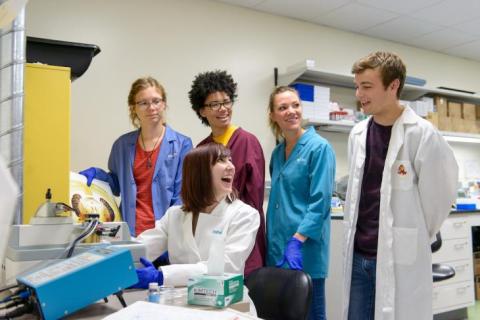Anne Stone elected to the National Academy of Sciences
Anne Stone elected to the National Academy of Sciences

Anne Stone, Associate Director of ASU’s Center for Evolution & Medicine (CEM), Director of the Center for Bioarchaeological Research and Professor in the School of Human Evolution and Social Change (SHESC) has been elected into the National Academy of Sciences in recognition of outstanding original research.
Election to the National Academy of Sciences is one of the highest honors a scientist can receive. Candidates are nominated by current Academy members and then extensively and carefully vetted before voted upon at the Academy’s annual meeting. Stone is one of 84 new members elected to the Academy, bringing its active members to 2,291.
"Recognition by the National Academy is so wonderful and appropriate for Anne Stone's innovative research at the intersection of evolution medicine. She transmits her creative enthusiasm to her students, and her contributions as Associate Directer of the Center for Evolution and Medicine are invaluable. She is a treasure”, says Randolph Nesse, Director of the ASU Center for Evolution & Medicine.
Stone is no stranger to scientific achievement. In late 2014, Stone and her research team discovered that tuberculosis likely spread from humans in Africa to seals and sea lions that brought the disease to South America and transmitted it to Native people there before Europeans landed on the continent. This groundbreaking research was published in Nature.
Stone’s specialization and main area of interest is anthropological genetics. Currently, her research focuses on population history and understanding how humans and the great apes have adapted to their environments, including their disease and dietary environments. This has three main strands: (a) Native American population history, (b) the evolutionary history of the Great Apes, and (c) understanding the co-evolutionary history of mycobacteria (specifically Mycobacterium tuberculosis and M. leprae, the causative agents of tuberculosis and leprosy, respectively) with human and non-human primates.
Stone has been a Fulbright Fellow (1992-93), a Kavli Scholar (2007), and in 2011 she was elected a Fellow of the American Association for the Advancement of Science. She has served on the editorial boards of the American Journal of Physical Anthropology and the Journal of Human Evolution, and currently serves as a senior editor of Molecular Biology and Evolution.
ASU’s Center for Evolution and Medicine brings together the best minds in the field of evolutionary medicine to tackle research on cancer, genetics, and pathogens as they affect human evolution. CEM’s main mission is to improve human health by establishing evolutionary biology as an essential basic science for medicine, worldwide.
SHESC seeks to understand the origins and implications of human uniqueness—such as culture, cooperation and complexity. They believe redefining social science is key to solving our most pressing and immediate human challenges including disease, conflict, and declining resources.
You can read more about this achievement at ASU Now.


